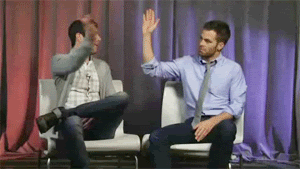They knew what they were saying at the table. The romulan ale just loosened their tongues to offend smoothly with words. Kirk referenced Hitler, Chekov slipped and said that line, Uhura was visibly disgusted by the way the Klingons ate, McCoy got in an argument at the table.
IIRC, Chekov said that line in the hallway before dinner, and thus before the Romulan ale. If so, then he can't blame alcohol this time

Err, Chekov was clearly making a cheeky, lighthearted joke to show Kirk that he was okay. He was definitely smiling.
He was delusional, I doubt that smile was him knowingly joking about it. XD
Oh come on, it's simply a joke, nothing more nothing less. If it was delusion, Chekov would show symptoms of panic or concern, and the scene would dwell on his condition more, like McCoy diagnosing the problem or Kirk fearing for Chekov -- really, before he regained consciousness, Kirk called him Pavel, and how often do we hear that? The joke is there to calm Kirk but also to relieve the audience.
Besides, something as heavy as delusion would hamper the tone of the scene itself, which is lighthearted to overall:
http://www.youtube.com/watch?v=MMaGnpVaSGQ
Chekov isn't going to say, "PSYCHE! GOTCHA! You should see the looks on your faces!"
the first line is problematic to begin with (which is why Nichols didn't want to say it)
What does it refer to? Does it have some specific cultural significance to Americans, say? Is it a quote from a sitcom or something?
On the surface, the words "Guess who's coming to dinner" don't sound particularly offensive. For referring to a bunch of murderous savages, that is.
It refers to the film "Guess Who's Coming to Dinner," a film from the 1960s about a white woman bringing her fiance home for dinner, and her fiance is a black man, so obviously he becomes the elephant in the room.
From Memory-Alpha's Star Trek VI page:
Uhura originally had a very racist line "Would you let your daughter marry one?" (that is, a Klingon), but the line had to be cut because Nichols absolutely refused to say it. Chekov's line "Guess who's coming to dinner?" was also originally Uhura's, but Nichols considered it also to be racist and declined to say it. The line was moved to Chekov. It was a reference to Guess Who's Coming to Dinner, the first major film to deal with interracial marriage, in which Katherine Hepburn, Spencer Tracy, and Sidney Poitier starred.
and the second line was just a quick but poor error in judgement, considering that he said that line to a delegation of non-humans.
Hardly. Only a hardened feminazi would find fault in terms like "mankind" or "fireman", and she'd deserve no pity for it; trying to twist "human" into a derogatorily exclusive expression only casts the Klingons in the role they hold anyway, as bloodlusty offenders who attack with words if they can't bring their disruptors to bear.
However, one of the main fears of the Klingon conspirators themselves was that the Federation was an imperialist power. Whether or not that's true or not, whether it's legit or not, is beside the point -- Chekov stating "human" rights as if it were automatic shows a mode of dominant thinking that rightly raises Azetbur's eyebrow. She called him out on that.
If you're trying to get two sides to the table, you don't use institutionalized language and assume everyone comes to the table on those terms. It's like an American going over to Egypt or Libya right now and saying everyone deserves American rights and values because he's been conditioned to think that way -- but from the other side, that'll instantly conjure up images of American imperialism and colonization, and repeats of Iraq and the Philippines. Assuaging fears about imperialism is why America won't send in ground troops to Libya.
We see the reverse of this a number of times in TNG and DS9, where Klingons are confused that humans don't or can't seem to adopt certain but deeply entrenched Klingon ways. The exchange between Chekov and Azetbur shows it going the other way, from humans this time.
I agree with this statement, but keep in mind Chekov's chronic habit of getting Russia/history facts wrong.
Aye, and sometimes we can never be sure if he's being cheeky or if he's sincerely wrong, too. Either way, I wouldn't bet on him to win any trivia contests any time soon.




 Maybe.
Maybe.